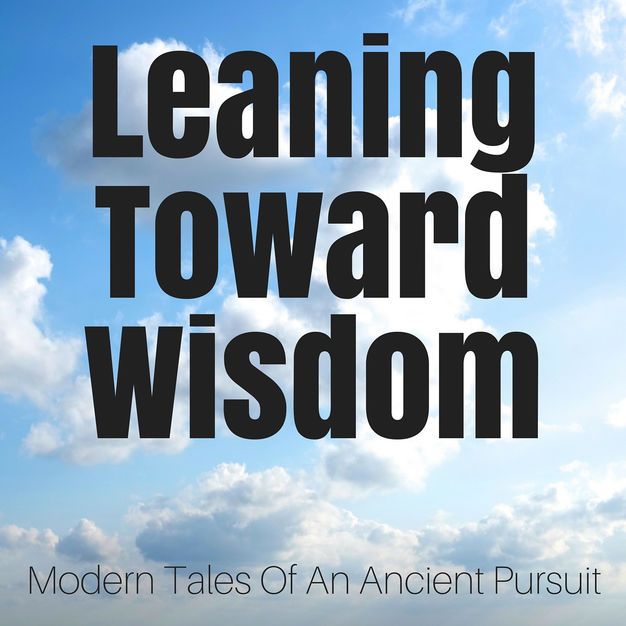
Leaning Toward Wisdom
Randy Cantrell
modern tales of an ancient pursuit
- 47 minutes 53 secondsMaking Yourself A Better Companion

Note: The picture in the featured image is my 100-year-old dad holding my 92-year-old mother’s hand as she lay dying. She passed from this life on April 4, 2024. They were married for 73 years, a testimony to the power of companionship.
Companion / Companionship
a person or animal with whom one spends a lot of time
a feeling of fellowship or friendshipDo you want to be alone with yourself?
And if not, then why do you think anybody else would ever want to be around you?
What is it about you that might be off-putting? Or unsafe?
Let’s begin with a word, EFFORT. It’s the thing we can all control. It’s the igniter in the combustion chamber of success. Whether it’s relationships – companionship, or some other pursuit – if we put in enough effort, we can always ensure our growth. Hard work may not result in an absolute win, but it will result in personal growth. The kind of growth that can impact every aspect of our life.
“Be of good cheer. Do not think of today’s failures, but of the success that may come tomorrow. You have set yourselves a difficult task, but you will succeed if you persevere; and you will find a joy in overcoming obstacles. Remember, no effort that we make to attain something beautiful is ever lost.” ― Helen Keller
In recent weeks I’ve talked a lot about my challenges with having too many spinning plates. This goes directly to EFFORT, which means we need to discuss another word, CAPACITY. There is a limit to our effort because our time is limited. And our ability is limited, too.
Time is easy to measure. It’s definite.
Ability may be impossible to measure. I suspect we’re all severely limited by our mind thinking “this is all I’ve got,” when in reality, we can do more. Evidence of such things is the Navy Seal training and many other physical/mental challenges that people regularly conquer. The person who wants to run their first marathon may quit thinking it’s too hard. But those who go on to run their first learn they’re more able than they thought. Those who quit are convinced it just wasn’t something within their reach. Like Henry Ford famously said…
“Whether you think you can, or you think you can’t — you’re right.”
What if we believed – truly believed – we were more able?
I have asked hundreds of executives, business owners, and other leaders a simple question: “Would you say that most of your dreams have come true?”
100% of them answer, “Yes.”
That doesn’t mean every dream was achieved. Or that they’ve got no more dreams left to chase. It just means they achieved most of the things they set out to achieve.
After they’ve weighed in, I’ll then say, “Makes you wonder what kind of potential we’re leaving on the floor, huh?”
What if we dreamed bigger? What if we chased something seemingly impossible for us? Our lives seem to be proving to us that we might be able to achieve most things we pursue. Why shouldn’t we reach for more? And why shouldn’t we help others reach for more?
Time is easier. Daily we say YES and NO. Daily we may say yes to things we’d rather say no to. We may also say no to things we’d really like to say yes to. All these decisions impact our time. They determine our calendar. And our calendar – those things we answer wrongly – determines our resentment and bitterness.
Suppose I say yes to an invitation I’d rather say no to. Maybe I’m cowardly in the moment. Maybe I’m too worried about hurt feelings. Not my own, but the person inviting me. Maybe social pressures are in play. But for some reason, I give the wrong answer and now this dreaded event is on my calendar.
Who is served by my wrong answer?
Not me.
Not my inviter.
Nobody else in my sphere. Because I’m going to dread it and it’ll certainly impact my demeanor and behavior.
That doesn’t mean I have to behave hatefully. I can certainly make the decision that’s ideal in a polite way. I can be gracious and thank the person for inviting me, but politely decline.
A major component of managing effort, ability, and time is truth. We’re surrounded daily by deceit. Lies are all around us. Constantly. We come to think that lying is just a way of life, but it’s not. If we’re devoted to the truth – and our commitment to telling the truth, firstly to ourselves, then to everybody else – we can avoid a lot of messes.
The lies we tell ourselves take a heavier toll than I suspect we understand. Who wants to live a delusion? Well, you’d think most of us because it sure seems we’ve all done a fair job of creating our own matrix to define our lives. We tell ourselves what is and isn’t possible without any evidence. We wrap ourselves in blankets of anxiety and insecurity whilst pretending to be confident, strong and able. We show off and show out instead of showing up. We drive expensive cars to look rich while being in debt and broke. All that fronting is a lie – a delusion to medicate ourselves on feeling better about our life.
What if we just behaved better?
What if we told ourselves and others the truth? All the time?
What if we stopped fronting and pretending?
What if we did the right thing in kindness? Always acting with integrity?
What if the delusions and misjudgments of others were stripped of their power? What if we didn’t respond to hateful treatment? What if we didn’t get drawn into the delusion?
A woman tells me about a sister, a lifelong drug addict. It’s a long, laborious story of hurt, betrayal, and awful behavior. The parents – they’re gone now, but after years of being taken advantage of by a daughter. The delusion of the wayward sister foisted onto everybody in her wake, most notably those people who cared the most about her. And when big sister draws a line after realizing that a relationship – companionship – with little sister is only enabling little sister to impose her delusions – does the venom really start spewing from her sister. All the vile, hateful things she once thought she had endured now pale in comparison.
She says, “I love her very much, but she can’t see it. She’s so warped in how she sees her life and my life, there’s no fixing it. I now realize I have to commit myself to people who I love who are willing to love me back.”
As I listen to a story I’ve heard more times than I can recall (all the people whose lives have been disrupted by a loved one disconnected from the reality of their own poor choices and bad behavior), I think of all the waste. Wasted lives. Wasted time. Wasted resources. Total loss!
I hate the term “mindset,” mostly because it’s overused. That viewpoint, perspective or whatever word might be more suitable to me – it’s important. It determines how we behave. It determines our choices. Our effort. Our dreams. Our aspirations. What we believe.
“…when people already know they’re deficient, they have nothing to lose by trying.”
― Carol S. Dweck, Mindset: The New Psychology of SuccessA Lack of Understanding Kills the Truth
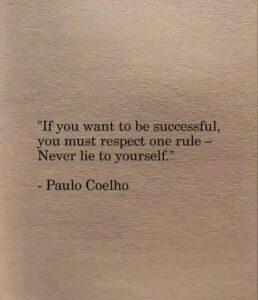 Becoming a better companion requires becoming a better person. That takes work and the work needs understanding.
Becoming a better companion requires becoming a better person. That takes work and the work needs understanding.The parents of a murdered boy sue the city because the police department proved corrupt. Evidence was intentionally hidden. The public doesn’t have all the information available to the family of the victim. Public outcry rails against the family as money grubby greedy people. But money is the least of the family’s concerns. In fact, justice for their son’s murder is secondary to wanting to restore faith in police so others won’t have to endure what they’re going through. The public doesn’t understand, but they think they do. They’re convinced they’ve got it all figured out. They know exactly why this family is suing the city.
But they’re wrong.
A corrupt detective had destroyed evidence. His lies destroyed the truth, for a time. It had painted an untrue narrative of the victim in order to pin the murder on an easy suspect. The detective would be the hero, convicting a person based on strong, but circumstantial evidence. Evidence it turned out that was largely the result of a fictional story.
Over time – years – most come to understand what they formerly didn’t. A clearer understanding results in truth. Truth results in a change in their behavior toward the family. That’s how understanding unlocks things for all of us.
Things may not be what we think. Our assumptions and cognitive biases can interfere with the truth. Bad enough for us to practice a lie – like the detective. Worst still for our lie to be put on others.
I suppose few adults have avoided grossly misunderstanding or being misunderstood. Likely we’ve all been severely misjudged along the way, too.
We hate it when we’re misunderstood. We think little of seriously discerning whether or not we’re properly understanding others though. Especially motives. Like the parents suing the city.
There’s wisdom in following the evidence. What do people do? What and how do they say it? What can we know to be TRUE?
The woman who vows to be a good wife and mother may sound credible. But when we see her drunken, promiscuous behavior another picture unfolds. The truth. No matter her claims we can discern by how she acts – the choices she makes – that she’s not what she claims to be. It may not explain why she does what she does. And over time she may be shown as a selfish, neglectful wife and mom. But she’s fabricated a narrative to make herself appear different. Better. Lovely. Faithful. Dutiful. Concerned.
Which is it? Is it what she says, or what she does?
YOU?
What makes you worthy of companionship? What makes you a good friend? A good spouse? A good parent? A good grandparent?
Words matter. Actions more.
It’s interesting that when actions are wise and good, speech is congruent with the behavior. It’s when behavior and choices are sinful and selfish that the stories told don’t match up.
Truth.
A commitment to high standards of behavior.
A determination to grow.
A willingness to make wrongs right.
A humility to accept responsibility.
A courage to change and improve.
A resistance against pointing fingers.
A bravery to look in the mirror and see ourselves more clearly.
It all starts here. With us. You. Me.
The path forward to provide value to others starts with making ourselves valuable by behaving more wisely. It’s hard work. Arduous. Daunting sometimes. Often troubling as we stare down our demons.
“Who you are tomorrow begins with what you do today.” ― Tim Fargo
We have to conquer ourselves, not others.
Romans chapter 7
22 For I delight in the law of God after the inward man: 23 but I see a different law in my members, warring against the law of my mind, and bringing me into captivity under the law of sin which is in my members. 24 Wretched man that I am! who shall deliver me out of the body of this death? 25 I thank God through Jesus Christ our Lord. So then I of myself with the mind, indeed, serve the law of God; but with the flesh the law of sin.
The key to improving our companionship skills is to get busy with our minds, which drives our behavior. Whether you serve God Jehovah or something or somebody else, that’s for you to decide. But we’re all serving somebody. Things go wrong when we serve ourselves. That makes us poor companions. It destroys our influence to help others. It diminishes our value, resulting in a loss for everybody, most especially us!
“You don’t know how it feels…to be me.” -Tom Petty
Or do you? We share more than we may think. Especially in the battle to become better humans. Some of us are fighting hard. Others, not at all. It’s the difference in keeping good company or not.
1 Corinthians 15:33 “Be not deceived: Evil companionships corrupt good morals.”
And there it is. Our companionship with others can be good or evil. The companionship we choose to surround us can be good or evil.
We get to decide the kind of companion we’ll be and the kind of companions we want to be around.
Companionship isn’t about perfection. It’s about a few critical things.
Caring. Both of you care deeply about each other.
Understanding. Both of you are committed to understanding each other as fully as possible.
Belief. Both of you believe in each other.
Encouragement. Both of you provide the encouragement necessary so each of you can grow individually and together.
Compassion. It’s a focus on others – you both remain focused on helping each other.
Grace. When you get it wrong, both of you are determined to make it right because the relationship is that important to you both.

Please tell a friend about the podcast!
26 April 2024, 9:29 pm - 31 minutes 52 secondsCustomer Service Fanaticism

In 1982 I stood in front of a group of employees of the retail company I was running to tell them, “Who would have thought we’d reach a time when saying “please” and “thank you,” “sir” and “ma’am” would be a competitive edge?” That was then. This is now.
Superior customer service is rare. That means the opportunities are extraordinary! Seize the day.
Abel seized the day. Here’s his story, as posted on my Facebook profile.
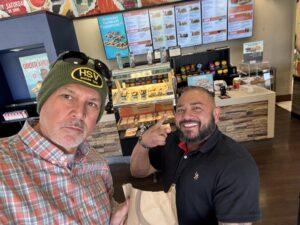 Abel with Schlotzsky’s in Grapevine, Texas
Abel with Schlotzsky’s in Grapevine, Texas
Schlotzsky’s Grand Prairie, Texas Is Today’s Customer Service HORROR Story (Small Hill Drive location)
Rhonda placed an order via the app (something she’s done with great frequency). Location: Grapevine, Texas. Problem: during checkout, the app encountered a problem with her saved credit card requiring that it be re-entered. Done. Order placed.Problem #2: during that payment problem evidently the order location changed from Grapevine to Grand Prairie. She didn’t notice that until we were in the drive-through of the Grapevine location. She explained the problem and they politely said, “No problem. Just call them to get a refund and we’ll make the sandwiches here.” So we pulled into a parking spot to call Grand Prairie.
She explained the problem and as they seemed to be helping her the connection went dead. I suspect they hung up on her (she was on the speakerphone). She dialed back. Explained it again, but this time it was a different person. “No, we’ve already made the sandwiches. No refund!” (Do this in the voice/tone of the Soup Nazi on Seinfeld and you’ll be dangerously close to the sound of this man on the phone). She asked for the manager. “I am the manager.”
I took the phone to ply my powers of persuasion but without success. The Sandwich Nazi wasn’t going to bend an inch. This $22 transaction was more meaningful than a long-time customer.
I entered the Grapevine store to see what I could do. A pleasant gentleman behind the counter was taking orders. I was 3rd in line. Immediately I thought, “This store isn’t run by the same folks that operate Grand Prairie.”
Turns out, I was right.
As I explained our quandary, the gentleman said, “Oh yeah, you were just in the drive-through.” I told him Grand Prairie refused to issue a refund. He was shocked. I asked what I could do. He asked me what we ordered and I told him. He punched it into his computer and said, “I got you.” No, no, no – that wasn’t the solution I was looking for and I insisted on paying. “No,” he insisted, “I got you.”
I thanked him and told him I was going to share this story. I gave him my business card, took a quick selfie as he handed me the order, gave him a bro hug, and thanked him asking, “What’s your name?” I’m pretty sure he said, “Able.” If not, I apologize. It was busy and I didn’t want to detain him.
Schlotzsky’s in Grand Prairie – Small Hill Drive – boos and hisses to your ownership and management for pathetic customer services
Schlotzsky’s in Grapevine – kudos and salutes to your ownership and management for stepping up to do the right thing. A special shout-out to the gentleman in the picture. He understands how to be excellent!
NOTE: Abel is his name! Hours later and I’m still very impressed with this man. Visit Abel and his staff at the Schlotzsky’s in Grapevine, Texas and tell them you saw this post.
Pursue excellence. Chase consistency in that excellence.
Do it in your professional life. Do it in your personal life.
There are opportunities everywhere!

Please tell a friend about the podcast!
19 April 2024, 10:21 pm - 31 minutes 28 secondsBeginning The End
Sloping seems more gentle than stumbling. And graceful. But when it comes to growing older it can be inaccurate. We don’t slope toward a face plant. We stumble. We fall. Face-first into the ground.
“Everywhere I look I see opportunities,” I said. The conversation was about how we see the world and our place. Me? I have lived life trying to take various hills. Then quickly seeking out a new hill to take. Sometimes the hill is simply making it better. Always making it better – or trying to – is the curse of my mind.
As I approach the beginning of my 67th year on the earth I know the end began on day one. Growing up, children only think about the present or the future. Age urges us to focus on the future and we increasingly lose track of the present. Today wasn’t great, but tomorrow will be better. Until we realize our past is larger than our prospective future, which prompts us to remember. Old people don’t tend to talk about the future, but they rehearse – often with boring repetition – the past.
In the future, I’m liable to be guilty of the same behavior even though I hate it. I hope to avoid doing it.
The end has begun. The end of many things has begun, sparking the beginning of others.
Experience, not age, has taught me how little I know. And how far I have to go to reach my ideal outcome. Mostly, that ideal outcome is me. Not in some self-centered way, but in the sense that all I will ever contribute to the world is myself. Being my best self. Nothing else matters.
My impact – whatever it may be – is all any of us have to offer. It’s not a minimal thing either. It’s massive. More so for some than others because our talents, drives, ambitions, and opportunities aren’t equal. There’s also luck. Mark Cuban remarked that luck was the difference between him being a millionaire and a billionaire. So it goes.
I feel like I’ve grown. Evidence shows it’s somewhat true.
Never mind that some likely view me in light of the worst chapters – or sentences – I’ve written. Everybody can make up their mind about me, or anybody else. And they do.
My days are spent focused on other people’s lives. Largely on their professional challenges and opportunities. Sometimes the focus is solely on their personal lives because what ails them is deeply personal. Challenges come from all angles. Oportunities, too.
The drive to make a difference is always the hill I’m trying to take. The methodology is asking questions.
I figure things out by asking questions. Asking questions provides answers. Questioning answers clarifies existing answers. The focus isn’t on me, so the questions are aimed at helping others figure it out. After all, it’s not mine to figure out. It’s a deep version of the old TV show, “This Is Your Life.” It’s not my life. I have my stuff to figure out. It’s only about me so I can better understand, ask better questions, and improve at helping others figure things out.
Relationships.
Careers.
Faith.
Financial circumstances.
Habits.
Beliefs.
Choices.
Behaviors.
Skills.
Abilities.
Perspectives.
Hobbies.
Preferences.
Everything is subject to change.
Everything decays. Decay starts at the beginning and continues until the end.
But Eternity changes everything because according to God’s Word, Heaven has no decay. Hell doesn’t either. Bliss or torture without interruption.
That’s not how life on earth works. Bliss, happiness, joy, peace – they’re all interrupted by decay. Each has enemies that disturb or destroy.
Our lives are subject to change because other people have choices that can interrupt our choices and preferences. Some years ago I had different goals and dreams than I had just a handful of years ago. The changes in my goals were driven by the choices others made, which compelled me to change my mind as I tried to figure out my best path forward. It happens. To all of us.
Those folks who enjoy blaming God for all the mishaps or misfortune in the world fail to realize we’re humans able to make up our minds. Our decisions impact the world around us. It’s not always good because we don’t always make wise choices. Our selfishness and sin take a toll on the world. We help create destruction, pain, sorrow, sadness, and damage.
We all can bring our foolishness to an end. At least we can begin the end of our foolishness. That doesn’t mean we can begin the end of everybody else’s foolishness. Since the point of this podcast has always been – and remains – an intentional leaning toward wisdom, I’m urging us to put in the work to get started ending our foolishness. Then keep working on it because foolishness is just around the corner in every decision we make – large or minute. And our choices will impact and influence everybody around us – and the world.
Relationships / Personal
Work / Professional
There are beginnings and endings in all areas of our life.

NOTE: My mom passed from this life at 2:58am today, April 4, 2024. She was a couple of months shy of turning 92.
Please tell a friend about the podcast!
4 April 2024, 6:11 am - 18 minutes 50 secondsSome Days You Eat The Bear…

February 1974, Baton Rouge. Near the entrance to Louisiana State University. A record store, my favorite hang out. Leisure Landing.
I enter the store and a record is playing. It’s alt-country. Weird. Because the guy’s name is Ian Matthews. Ian isn’t a southern United States name.
I grab the album cover and begin to read the back. Two players who I already admire are on this record. Jeff “Skunk” Baxter of Steely Dan fame and David Lindley of Jackson Browne fame. I love both of these guys. I’m enjoying this record. Ian is an Englishman playing alternative country, folksy tunes.
Some days you eat the bear…
Some days the bear eats you.
I’ve never heard this artist before.
I’ve never heard this phrase before either.
But I’m street smart and quickly discern it means, “Sometimes you win, sometimes you lose.”
That’s today’s show. A new episode from inside The Yellow Studio 4.0.
Enjoy!

Please tell a friend about the podcast!
9 March 2024, 1:21 am - 43 minutes 30 secondsUp All Night: Breaking Spinning Plates“The only way to learn how many plates you can spin is to break some plates. The question of capacity guarantees failure.” – T.S. Elliot
He is no fool who gives what he cannot keep to gain what he cannot lose. – Jim Elliot (no relation to T.S. that I’m aware of)
I’m not a plate-spinner.
I am able to multi-task, but it’s not actually multi-tasking at all. It’s really intense focus on a single thing with enough speed to get a number of things accomplished over a short period. That makes it look like multi-tasking.
Themes of the week have been:
- Self-control or self-regulation – manifested in the struggles people have with porn addiction, marital infidelity, alcohol, work, parenting, unruly children, loneliness and more
- Capacity and resources – what’s our limit?
- Congruency – frustration in hearing people (often bosses) say one thing, but do something completely different
- Failing to figure out how or where we fit – not understanding why or how we’re making a difference / wondering if we are
I’ve got too much going on – too many irons in the fire. I’m working on it and I’ll share more.

Please tell a friend about the podcast!
• Join our private Facebook group
• Email meHelp Me Reach My $1,000 Goal
I plan to start vlogging from Hot Springs Village, Arkansas because the place is spectacular.
The scenery will make for a great backdrop. Plus, there are many places I’d like you to see.
To help, click the link (or the image below) to donate any amount you’d like.
Amazon Gift Certificates (use [email protected]).
Thank you!29 February 2024, 6:11 am - 48 minutes 37 secondsDoing Hard Things Well

Galatians 6:7-9 “Be not deceived; God is not mocked: for whatsoever a man soweth, that shall he also reap. For he that soweth unto his own flesh shall of the flesh reap corruption; but he that soweth unto the Spirit shall of the Spirit reap eternal life. And let us not be weary in well-doing: for in due season we shall reap, if we faint not.”Show High-Lights
- Anybody can do easy. It requires resolve and grit to do difficult things. It requires skill, talent and solid determination to learn to do hard things well.
- We’re the constraint.
- The value is in battling ourselves, not others.
- Feelings don’t equal evidence. Figuring out what’s real and what isn’t is hard work worth doing well.
- Don’t discount your will power. Don’t over-estimate it either. It’s a major component of the work, but it’s not the only component.
- Who you surround yourself with matters. The environment we put ourselves in has a major impact in our ability (and agility) to navigate figuring out how to do the hard things well. We’re all influenced by our surroundings. Guard your environment.
- Beliefs become reality. But delusions – which seem real – are still delusions. That’s why evidence based living is still the path forward to mastering hard things.
- Consider what’s possible even if you initially think it’s not. Learn what you don’t yet know. Figure it out. Just make sure you’re not restricting yourself with false notions. Don’t feel sorry for yourself or feel like others can do it, but you can’t.
- Ponder your ideal outcomes. Imagine what might be available – and possible. Often, there’s sufficient evidence for what probable, while we refuse to think it’s even possible. It stops us dead in our tracks when we could be many miles further up the road to greater success!
- Compounding is powerful. Doing a little bit consistently over time likely beats trying to sprint until we’re winded.
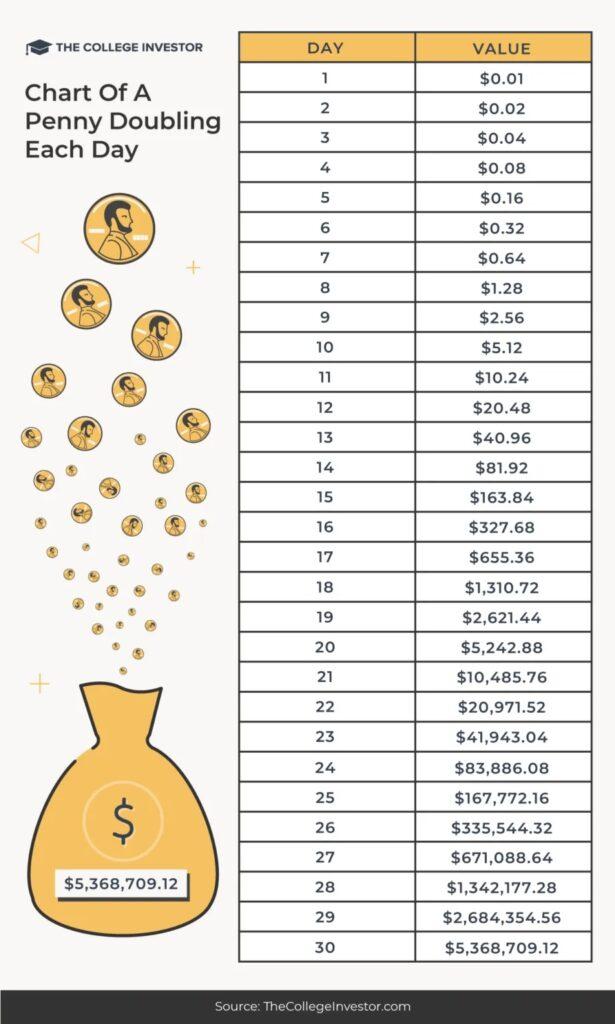
- Learning to do hard things well takes time and repeated efforts that become ingrained. Doing hard things well is habitual. Otherwise, it’s inconsistent. Anybody can be a minor league player. Only those who perform well every single time can be major leaguers.
- Laziness and procrastination are easy. That’s where the masses live. Don’t be fooled into thinking you can behave just like them and achieve something greater than average. Or worse.
- Berating yourself is worthless. Accurate self-examination is priceless. See yourself for what you truly are and fix what ails you. Lean into your strengths. Shore up weaknesses so they don’t derail you. Devote yourself to making yourself better in every way. Accept nothing less. Remember, you’ll either make a way, or you’ll make an excuse.
- Learning means making mistakes, but it means making mistakes where you’re still doing your best – and making mistakes you know you can recover from. When you get it wrong – and you will – determine that you’ll make it right. Only fools repeat their mistakes. Learn from yours and get better. Always be getting better!
- Working is hard. Retirement is hard. Health is hard. Sickness is hard. Being in a great relationship is hard. Being lonely is hard. Whatever you choose to name, on either end of the spectrum – it’s hard. Every day we get to decide which hard we’ll pursue. But there’s a major difference in the positive things that are hard. They require more effort on the front end. A higher investment upfront. By doing that, we may be able to forego a tougher consequence.
- Self-discipline is the key. Let’s be clear about the definition of discipline. Discipline is the quality of being able to behave and work in a controlled way which involves obeying particular rules or standards. Self-discipline is our ability to control ourselves.
- Execution matters! If we’re going to learn to get good at doing hard things well, we have to find the way to do them well more often than not. Ideally, to do them well all the time, every time.
- Doing hard things well drives success because it makes us unique. It gives us a competitive edge over everybody else who is unwilling or unable to do the hard things. The harder it is, the fewer people willing to do it. Or the fewer able to do it. So if you will – and if you can – you begin to join the ranks of a more exclusive, high-performing crowd. Be a lemming, be average or put in the work and be something much, much more.
- It’s true in all areas of human endeavor. These senior years for us are proof. Shameless retirement – a show I did not that long ago – isn’t just about being unashamed in front of others, but mostly it’s about being unashamed of our own choices and way of life. It’s about doing whatever we can do we don’t intentionally create regrets. Lifestyles creep up on us if we’re undisciplined. Lots of people follow our federal government by spending money they don’t have. Every good program – every good thing to buy – doesn’t justify the purchase. And just because we need it (or claim to) doesn’t mean we can afford it. But the bigger the government gets the more we spend ourselves silly justifying it by exaggerated claims of the good it will do – or the dire need for it. It’s no wonder that our federal government has corrupted our entire culture to feel justified with idiotic spending. Spending is easy. Restraint is hard.
- The battles of life – if we’re going to win – require learning how to do hard things well enough.

Please tell a friend about the podcast!
• Join our private Facebook group
• Email meHelp Me Reach My $1,000 Goal
I plan to start vlogging from Hot Springs Village, Arkansas because the place is spectacular.
The scenery will make for a great backdrop. Plus, there are many places I’d like you to see.
To help, click the link (or the image below) to donate any amount you’d like.
Amazon Gift Certificates (use [email protected]).
Thank you!8 February 2024, 6:11 am - 38 minutes 38 secondsLeaning Toward Creativity

About 15 years into my podcasting journey I recorded an episode entitled, A Virtual Tour Of My Podcasting Studio. I published it 9 years ago today, January 25, 2015. In 2019 I published an update, Welcome Inside The Yellow Studio (This Is How I Podcast Now). Since then I’ve tried to keep a page on my personal website updated – Inside The Yellow Studio.
The technology has changed monumentally since I began almost 24 years ago. Things have gotten so much easier – and so much more refined. As much as I enjoyed those early years when all of us were figuring it out, today is better. Today’s show is less about the operational part of podcasting though and it’s more about the metaphor of The Yellow Studio – creating, publishing and sharing. It’s about the broadcasting of stories, ideas, observations and insights. It’s about a journey into creativity. Well, it’s about a journey deeper into creativity. I won’t bore you with the earliest memories of the journey which began in childhood engaged in all sort of acts of imagination.
As much as I love to learn, which requires mounds of consuming (reading, listening, observing), I’m more in love with creativity, crafting something from mostly nothing. Starting with a spark. Sometimes small. Sometimes not. A burning ember sometimes. A bolt of lightning at other times.
Creativity takes practice. As in, you have to do it. Also, as in you have to do it repeatedly to improve.
Bouts of creativity against not being creative at all have prevailed my entire life. As a little boy playing with an impressive Matchbox car collection to laying in the yard looking up through the pines at the clouds wondering what to do next. Enthusiastic hours spent building a fort in the woods or a treehouse in the backyard coupled with lethargic hours spent telling ourselves we had nothing to do. Boredom always best fought off by engaging the gears of our imagination so we could create hours of delight often doing something we’d not done before. Or doing things we’d done a million times before. And ready to do it again one more time because we loved it so.

Please tell a friend about the podcast!
• Join our private Facebook group
• Email meHelp Me Reach My $1,000 Goal
I plan to start vlogging from Hot Springs Village, Arkansas because the place is spectacular.
The scenery will make for a great backdrop. Plus, there are many places I’d like you to see.
To help, click the link (or the image below) to donate any amount you’d like.
Amazon Gift Certificates (use [email protected]).
Thank you!25 January 2024, 6:11 am - 50 minutes 58 secondsShameless Retirement
Shameless
An adjective meaning insensible to disgrace
Retirement
A noun meaning a withdrawal from one’s position or occupation or from active working life or the age at which one normally retires
The United States adopted an initial retirement age of 65 with the Social Security Act of 1935. By the mid-20th century, almost all countries had adopted a retirement age of between 60-65. About 40% of Americans receive Social Security retirement benefits as their exclusive income. The average benefit is just over $1700 monthly.
Financial advice is varied, but advisors widely suggest no more than 70% of your retirement income should come from Social Security. If you were to collect the average amount – $1700 – then you’d have a monthly income of about $2400 if that math worked in your life. That’s $28,800 a year, hardly a comfortable living for most people.
However, as of this year (2023), the average check to 65-year-olds is about $2500 a month. Apply that 70% suggestion, then your total monthly income could rise to $3600, or $43,200 a year. That’s $14,400 more than $28,800.
Lots of people are doing the math urging folks to collect Social Security as soon as possible – age 62. For some, that may make sense. For others, it may not. I’m not an accountant or financial advisor. I’m just a guy sitting inside The Yellow Studio making observations about all this now that I’m 66-1/2, full retirement age.
Full Retirement Age
Full retirement age (FRA) is the age you must reach to receive full retirement benefits from Social Security. Your FRA varies depending on the year you were born. The FRA in the United States is 66 years and two months for those born in 1955, increasing gradually to 67 for those born in 1960 or later. Since my wife and I were born in 1957, 66-1/2 is our FRA. I achieved that in November and Rhonda hit it here in December.
Life is more than numbers, but the numbers matter. What about things other than numbers?
Routine and habits tend to overpower older lives. Neuroscience informs us that we’re all subject to habituation.
Habituation
Habituation is a decrease in response to a stimulus after repeated presentations. The American Psychological Association says it involves “growing accustomed to a situation or stimulus,” thereby diminishing its effectiveness.
We commonly call it being stuck. Getting in a rut.
What produces satisfaction or happiness?
Meaning is number one. Control is number two.
We need meaning in our lives. Some way where we measure our worth or value in the world.
We also need a degree of control over our own lives. Freedom is choice – the ability to make a choice is largely how we execute control.
As we grow older both of these can be challenges. No surprise because both are challenges no matter our age.
We’ve all experienced moments where we hit a high in meaning and control. Like that first big raise we got, it didn’t seem to last. Things seem to settle into some sort of a norm sooner than later.
The hedonic treadmill is the idea that an individual’s level of happiness, after rising or falling in response to positive or negative life events, ultimately tends to move back toward where it was prior to these experiences. It’s like that proverbial set point for our weight. Changing that thermostat is hard. Doable, but hard.
This is where habituation is a double-edged sword. It helps us progress and move forward even though it may rob us of some joy. And without habituation, we’re incapable of moving. Imagine having to make every little decision afresh every day. How exhausting would that be? So we need habits to a point. We just need to be mindful of our need for – the benefits of – change! New things. New experiences. New learning. Growth.
Scary can be good. Sure, it can be bad, too. But just because it’s scary doesn’t mean it’s one or the other. It means scary is uncomfortable because it’s outside our habits.
It’s how we effectively combat boredom or complacency. Joy and happiness are not the result of boredom or complacency.
Meaning. Control. Happiness. Joy. Fulfillment. Contentment. Purpose.
Pile on top of that some other words.
Overhead. Expenses. Income. Savings. Bills.
Add still more.
Family. Relationships. Community.
These aren’t age-specific terms. Whether we’re young, old, or somewhere in between these words all matter. Some bubble up to the top and overpower the others. Then they fall back down somewhere on the hierarchy of what matters most to us. In that moment. It’s that roller-coaster that is our life as we navigate challenges, opportunities, and whatever mundaneness rules our lives.
The other night Rhonda and I are watching Outlander. She’s read the books and we’re now up to season 7, the most current one. Well, as with most great stories, there’s lots of action. Constant drama. Ongoing challenges and difficult circumstances. Jamie and Claire are the main characters, a husband and wife. I said, “They can’t just settle on a little farm somewhere and live a happy life.” Rhonda replied, “There wouldn’t be much of a story to that.” Exactly.
But so often we claim we’d prefer this trouble-free existence. A life where everything is boring and mundane. But if we had a life like that we’d grow disengaged, disinterested, and ridiculously miserable. Research has shown if you put people in a room with nothing to do except to give themselves a mild shock, they’ll shock themselves. Just to feel something. Just to do something. Instead of sitting passively doing nothing except being alone with your thoughts, you’ll shock yourself. Fascinating proof that we crave engagement.
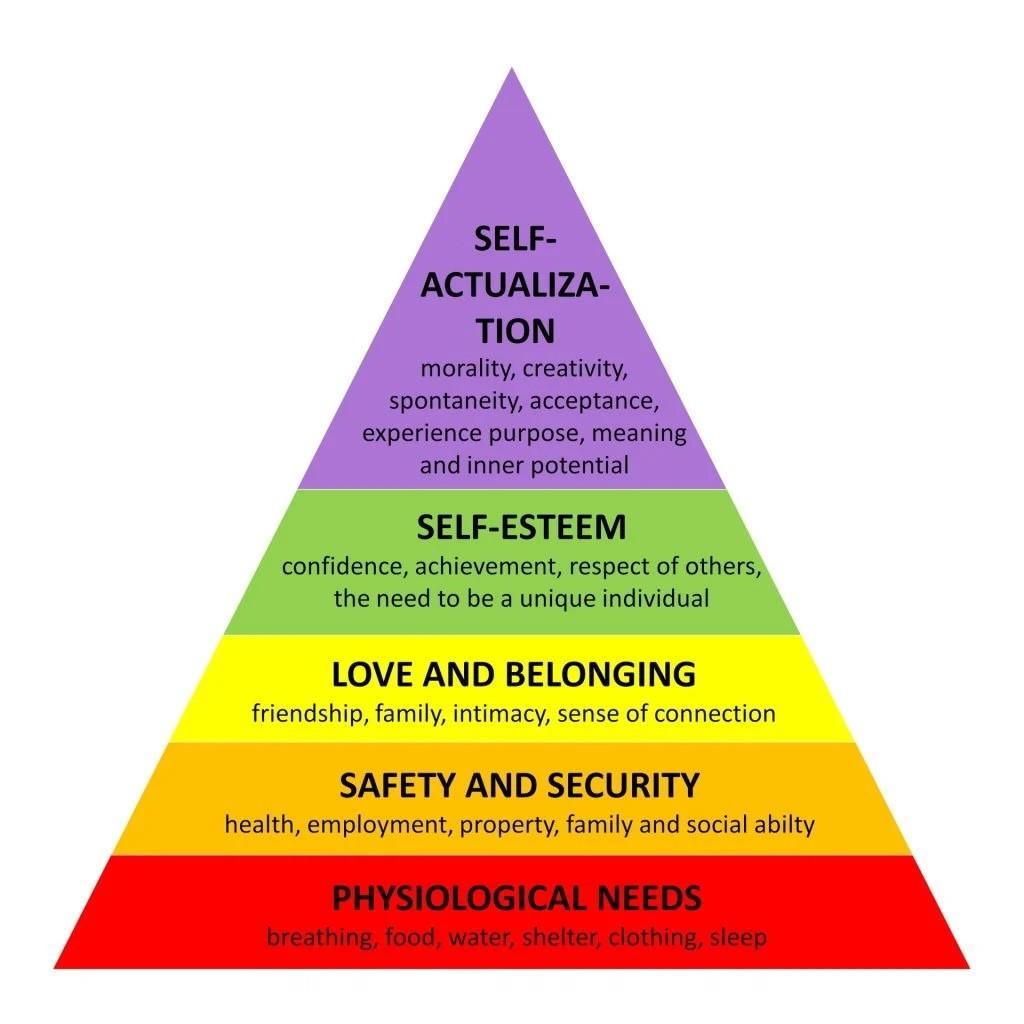
Maslow’s hierarchy of needs is a motivational theory in psychology comprising a five-tier model of human needs, often depicted as hierarchical levels within a pyramid. I suspect once you move up past the first and second levels things can vary depending on how we roll, but I don’t think there’s much doubt that those first two are real survival needs, which is why money is so important. Whether it’s income or savings, money enters and exits our lives daily because we have physical and safety needs. We need a place to live. Food to eat. Clothes to wear. A place to sleep. And we need to know we’re not going to constantly fight to stay alive in the process.
As we get older those first stages of needs can become more challenging. It’s amplified when control begins to slip away, too. Meaning erodes, too. It’s a recipe for late-life misery.
Age takes a toll on all of us. Just recently President Jimmy Carter buried former First Lady Rosalynn Carter, his wife of 77 years. President Carter is 99. Age doesn’t care any more than death. Death, which ideally is preceded by old age, comes for everybody. And however difficult youth may seem, old age is more difficult, but hopefully, life has taught us the resolve needed to navigate it successfully. Hopefully, we’re surrounded by family that will help us. Still, it’s up to each of us to do our part to battle what we can, accept what we can’t battle, and keep moving – even if it’s a mere inch at a time – forward toward what is next.
Now What?
It’s the most important two-word question I know to ask of myself or those I coach. As I stare into an abyss of misery presented in the form of some current challenge, I ask myself, “Now what?” Now what am I going to do? Now what’s my best move forward?
As I help somebody staring into their own abyss, I ask of them, “Now what?” Now what do you want to do? Now what are you going to do?
No point in fixating on how we got here except to learn from it.
No point in finger-pointing so we can assign blame.
No point in feeling sorry for ourselves.
No point in assuming the role of a victim. We may think that’s helpful, but it’s not.
Mostly, we’re the victims of our own making. Not always, but much of the time.
Shameless retirement is about owning it. It’s about figuring out how we can best move forward later in life. It’s not about resignation from growth, learning or improvement. Rather, it’s about figuring out to to keep making those components remain vital in our daily existence.
Some days you eat the bear. Some days the bear eats you.
a proverb meaning sometimes you win and sometimes you lose; everybody has successes and failures
Still, we press on. Unashamed. Because our progress is our own unique journey that we hopefully share with somebody we love – and somebody who loves us. And more than maybe ever before, it’s about behaving in a way where we have pride in ourselves, but not because what we’re doing is performative. It’s not about showing off, but it is about showing ourselves.
The old couple has been married for almost 60 years. Their little frame house was built about 40 years ago. They bought it new. Less than 1000 square feet has defined their married life as far as a house goes. They drive a modest little Toyota. About 8 years ago they constructed a small, micro-bedroom suite in their basement to see if they might rent it on Airbnb. Turns out it resulted in nightly rentals of about $50, which made an enormous difference in their financial lives. A godsend they’ll tell you.
They seem quite contented. Happy even.
Game nights with neighbors. Friends who have lived around them for years occupy their lives.
I have no idea what their financial situation looks like, but it appears their needs are met and financially, that’s good enough. Those other needs seem to be well under control as they march forward day by day. Month by month. Year by year.
Does it matter if miles away some other couple, years younger, may occupy a million-dollar house on a lake? Nope.
Does it matter if somebody else – even a close neighbor or friend – has an investment portfolio that makes them look pathetic? Nope.
Does it matter how they stack up financially, emotionally, physically, or spiritually to anybody else? Nope.
And it’s got nothing to do with retirement really. Or being older. Mostly, it seems to have to do with living without shame. Living respectfully, respectably, honorably. Being the best human we know to be. Putting in the hard work to build the highest integrity possible.
I’ll add to it – because I’m an unashamed Christian – devoting ourselves fully to God, the Creator.
The Apostle Paul wrote to the congregation in Rome in Romans 1:16 “For I am not ashamed of the gospel, for it is the power of God for salvation to everyone who believes, to the Jew first and also to the Greek.”
Contrast that with another scripture that properly depicts a life of depravity, selfishness, and sin.
Jeremiah 6:15 “Were they ashamed when they committed abomination? No, they were not at all ashamed; they did not know how to blush. Therefore they shall fall among those who fall; at the time that I punish them, they shall be overthrown,” says the LORD.”
Shame is helpful when we’re deserving of it. When we’re wrong it can help us course correct.
Shamelessness is beneficial when we’ve earned it. When our behavior gives us no reason to be ashamed.
Not because we’re better than somebody else because we can always find somebody doing it worse than us.
Not because we’re worse than somebody else because we can always find somebody doing it even worse.
Shame and shamelessness are uniquely our own merit based on right and wrong. Some of that, spiritually is an absolute truth, based on the Bible as the Word of God. Some of that, as in how we manage our retirement, is uniquely our own decision to navigate it however we choose.
I would hope by the time we reach retirement age we’ve learned a valuable lesson. What others choose to do in their retirement has no impact on us…unless we let it!
So what have I learned now that I’ve reached full retirement age…and now that I’m days away from getting my first Social Security check?
I could pine about what I might wish I’d done sooner, but that’s past and I now don’t have statistical time to do anything about it except perhaps to pass it on, but I’m going to refrain. Because if you’re younger, you stopped listening thinking, “Retirement? I’m decades away from that.” And if you’re older, then you’re in the same boat as me – it’s too late to do much about it now. For example, I could tell you I wish I’d invested MORE, earlier and just let it sit in something steady and slow like an S&P Index fund. But since I don’t really feel like I’ve got decades to ride out the stock market fluctuations, that’s not really helpful to me now. 😉
Here’s what I have learned that may be helpful though.
It’s your life, your money, and your choice. Nobody else gets a vote or a say. Unless you decide you’ll give it to them. Don’t.
It’s your responsibility. All of it. You’re not a victim except of your own bad decisions. Don’t repeat them. Fix them if you can. If you can’t, figure out the best way to move forward in spite of them.
It may not be what you most hoped for, but it can still be alright. Again, you must find a way forward. If that means lowering your expectations, then get busy and get ‘er done! Life isn’t going to wait so don’t waste it.
Debt will destroy you. Ditch it as quickly as possible. If you don’t have it, don’t take it on now. Other than health, it’s the single biggest game changer in determining the quality of your life.
Make up your mind to finish strong. Even if your start, or middle wasn’t spectacular…remember it’s how you finish. So finish strong!
Others. It’s not about you. It’s about your impact on others. Be as impactful as you can – in all the best ways. Do for others what they might be unable to do for themselves. Let service define your life. You get to decide what that looks like for you. I spend hours a day listening to people as they battle their challenges. I podcast. I create. I write. I preach. The root of it all is my urge to make a positive difference for others. Fundamentally it’s selfish I suppose because it may do much more for me than it does for somebody else. I do it because I’m wired for it, I love it and I learned long ago – I’m good at it.
Cash flowing life is for me the very best choice! Retirement doesn’t mean not earning income. I continue to work. The work isn’t the same. But income matters and I’m now focused on how much time I’ll trade for how much money. It’s a two-fold equation. How do I want to spend my days? How much do I want to earn? I’m harmonizing the two. For me, that works. You do you.
My financial goals have changed through the years. Today, I want to earn as much money as I make through Social Security. As a couple, if we can match that with our monthly earnings we’ll be more than comfortable. It’s not about opulence or being fancy. It’s about contentment and resting easy. Free of fretfulness and worry. As much as possible.
About a year ago I began to carefully plan this stage of life. As I put numbers into a spreadsheet of projected and real monthly expenses I had an epiphany. And I am just a man in search of an epiphany. I started thinking of income in terms of months of expenses. It happened when I put some money into a high-yield CD. When the CD matured I realized the return would be equal to a few months of total overhead. That made me start thinking in those terms. With investments and income. The game grew and became this question, “How many months of expenses can I defray – and how quickly?” So if a CD investment can shave off 2-3 months of expenses, then that leaves me with 9-10 months of income I need to earn to offset the balance of months.
Figure out what game you want to play and enjoy it. Embrace it. Execute it. Make the most of it and if it works swimmingly, great. If it doesn’t, adjust.
Fall in love every day.
Romans 5:8 “But God demonstrates His own love toward us, in that while we were still sinners, Christ died for us.”
Establish your own priorities. This one is mine. I don’t always get it right, but it’s a constant point of emphasis. God comes first. He demands it.
I fall in love with Rhonda every single day. I chose to because I chose her. As we approach our 46th wedding anniversary I refuse to let complacency or boredom rule our marriage. I refuse to let any other human become a bigger priority. It doesn’t mean I love the rest of my family less because we all have a greater capacity for love than we likely realize. It means she’s THE priority for me though. And I hope to behave in a way that I continue to help her fall in love with me more every day.
Laugh. Smile.
It’s a verb. An action word. Do it. Find a way.
You see me post lots of cartoons. Ballard Street. Herman. Far Side. They make me laugh. Smile. Funny is a big part of my daily existence. I’m always interested in things I find funny. Like music, I can’t imagine living without humor.
Cry. Embrace sorrow.
Not just for yourself, but firstly, for others. Let the tears move you to do something if you’re able. If you’re not, let tears move you anyway because it means you’re not past feeling. It means your empathy is intact and that makes you a better human.
Give it a moment or a time. Don’t fall into a hole of darkness that’s hard to pull away from, but lean into sadness or sorrow. Know why you’re feeling what you’re feeling.
Share. Don’t go it alone.
Be vulnerable with somebody. We’re all fighting a fight. We’re all happy about something. We need others to laugh with, to cry with, to plan with, to make our lives fuller. Richer.
We also need people who will push us to become better.
Some weeks ago upon greeting a client, I inquired how life was treating him. He said, “I couldn’t be better.” I replied, “Sure you could.” We laughed. It’s what I do. I laugh. I challenge. He knows I have no dog in the hunt except to help him become better. Always better!
Surround yourself with somebody – or a group of somebodies – who can do that for you.
Expel the unsafe people from your life. All of them. As quickly as you can.
Don’t confuse this with people who want your best and challenge you. While you need those people to be safe, understand their safety is because they have only your best interests at heart. There’s nothing in it for them except seeing you succeed.
Unsafe people are those people who do not have our best interests in mind. They’re only thinking of themselves. They want what they want and they mostly want you to conform to whatever will help them achieve their outcome. They’re filled with harsh, critical, self-based judgment and any errors or mistakes you make will probably be publicly held against you. In a word, they’re toxic.
You can’t get them out of your life fast enough. I’ve never anybody err on the side of removing such people too quickly. Mostly, because I don’t think it’s possible.
Keep asking, “Now what?”
Today is a page. Perhaps an entire chapter. As long as you’re alive you’re writing your life. Don’t stop writing.
Turn the page and figure out how to create the most profitable chapter you can today. Right now. This moment.

Please tell a friend about the podcast!
• Join our private Facebook group
• Email meHelp Me Reach My $1,000 Goal
I plan to start vlogging from Hot Springs Village, Arkansas because the place is spectacular.
The scenery will make for a great backdrop. Plus, there are many places I’d like you to see.
To help, click the link (or the image below) to donate any amount you’d like.
Amazon Gift Certificates (use [email protected]).
Thank you!7 December 2023, 6:11 am - 36 minutes 30 secondsBe Careful About The Hit Song You Record ‘Cause You’ll Be Playing It The Rest Of Your Life
Sorry. My usual show notes don’t exist. And I was too lazy this time of year to write them. But I do have a couple of calls to action.
One, join us over in the Facebook group if you care. I’d love to have you in the group.
Two, support my efforts to lean hard into video in 2024. My goal is to crowd-fund $1000. I’m about 50% there so it’s coming along. But you can help me out if you’d like (see below).

Please tell a friend about the podcast!
• Join our private Facebook group
• Email meHelp Me Reach My $1,000 Goal
I plan to start vlogging from Hot Springs Village, Arkansas because the place is spectacular.
The scenery will make for a great backdrop. Plus, there are many places I’d like you to see.
To help, click the link (or the image below) to donate any amount you’d like.
Amazon Gift Certificates (use [email protected]).
Thank you!30 November 2023, 6:11 am - 2 minutes 32 secondsHappy Thanksgiving 2023!
I appreciate you all very much. Thank you.

Please tell a friend about the podcast!
• Join our private Facebook group
• Email meHelp Me Reach My $1,000 Goal
I plan to start vlogging from Hot Springs Village, Arkansas because the place is spectacular.
The scenery will make for a great backdrop. Plus, there are many places I’d like you to see.
To help, click the link (or the image below) to donate
Sweetwater Gift Certificates (use [email protected]).
Thank you!23 November 2023, 6:11 am - 32 minutes 39 secondsFinding A Way, Not An ExcuseThe Reality Distortion Field. Guy "Bud" Tribble was Vice President of Software Technology at Apple Inc. As Apple was developing the first Macintosh computer in 1981, Bud used the term to describe Apple's founder Steve Jobs. The term seems to have originated in a 1966 episode of Star Trek when it was used to describe how the aliens encountered by the crew of the starship Enterprise created their own new world through mental force. It seems the great thinkers who are doers, like Steve Jobs, embrace (and enjoy) living in the reality distortion field of their own making. That is, they see things the rest of us don't. Vivid imagination coupled with obsession drive produces the likes of Steve Jobs and Elon Musk. Is it distortion though? It is when compared to the current state. Coupling the term "reality" to it makes it seem as though it's delusion. Something that's inaccurate, or unreal. Not true to the reality. Like a photograph that's distorted. Or the lenses in a pair of mis-prescribed glasses. The achievements of self-driven maniacs to build great things, or to solve complex problems don't seem to the result of delusion though. Rather, they seem to be imagined by people capable of seeing what the rest of us can't. Yet. “No great mind has ever existed without a touch of madness.” ― Aristotle The madness is subjective. What appears as madness to one feels ordinary to another. “The reasonable man adapts himself to the world: the unreasonable one persists in trying to adapt the world to himself. Therefore all progress depends on the unreasonable man.” ― George Bernard Shaw, Man and Superman I think that term better conveys the truth, unreasonable. It's less of a reality distortion field and more of an unreasonable - or beyond current reasoning - view of what is possible. It's a reality bending field where the unreasonable man adapts or bends the current reality into a new, improved future reality. Then continues to do it over and over again. Apple is introducing the iPhone 15. I'm currently producing today's show on a 2023 Apple MacBook Pro. Nevermind that just this week Apple introduced some brand new MacBook Pro models. In 1984 I purchased the first Apple Macintosh computer. That was then. This is now. Not even Steve Jobs, in 2011 at the time of his death, could have imagined the current technology. Had he lived, he most certainly would have figured it out though - and who knows what bigger, better products may have emerged under the Apple brand name? Steve Jobs died 12 years ago (October 5, 2011). Who knows what he may have imagined? Or what things he may have seen as persisted in trying to bend the present technology to fit his vision? It's what unreasonable men do. Mostly, unreasonable people find a way, not an excuse. We embrace different degrees and characteristics of unreasonableness as we navigate the various chapters of our life. “Only those who will risk going too far can possibly find out how far one can go.” ― T.S. Eliot How unreasonable are you? And in what ways - or about what things - are you unreasonable? Are they positive or destructive? Some of the titans of innovation have been so focused on what they see and what they want that others around them pay a high price. Sometimes, it's a price willingly paid. For example there are stories of high level employees of Apple and other high-performing companies where they burned out due to the intensity, pressure and elevated expectations. Opting for employment elsewhere, some experience boredom though because the pace is slower, the expectations lower and the strain much less difficult. In the absence of those things that burned them out they realized there was a void in their daily joy so they returned back to the company from which they resigned. Is that unreasonableness positive or destructive? Maybe both. There are other stories of these mono-maniacs on a mission (Tom Peters coined that phrase in "In Search of Excellence") who...16 November 2023, 6:11 am
- More Episodes? Get the App
Your feedback is valuable to us. Should you encounter any bugs, glitches, lack of functionality or other problems, please email us on [email protected] or join Moon.FM Telegram Group where you can talk directly to the dev team who are happy to answer any queries.


 Weight Loss Made Real: How real women lose weight, stop overeating, and find authentic happiness.
Weight Loss Made Real: How real women lose weight, stop overeating, and find authentic happiness.
 Alone: A Love Story
Alone: A Love Story
 Logical Weight Loss
Logical Weight Loss
 Aprende ingles con inglespodcast de La Mansión del Inglés-Learn English Free
Aprende ingles con inglespodcast de La Mansión del Inglés-Learn English Free
 Well Beyond 40
Well Beyond 40
 Eat, Move and Live Better
Eat, Move and Live Better